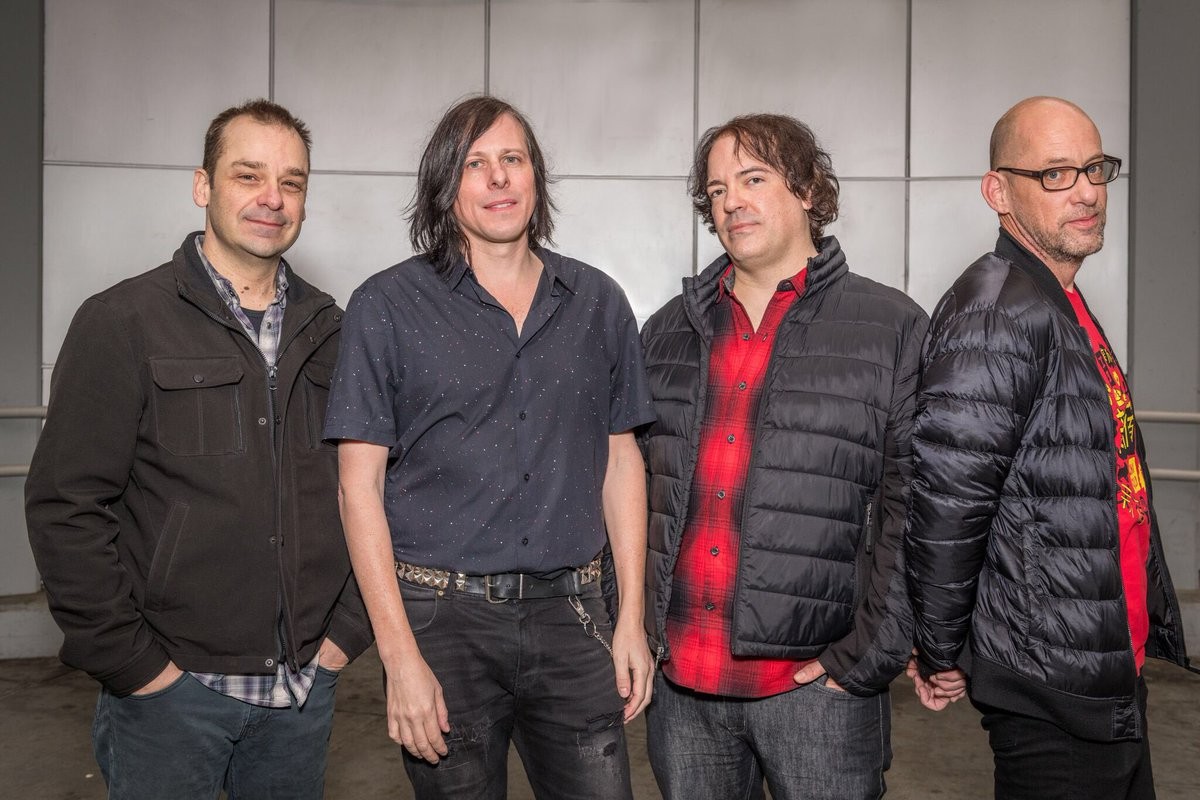
The Posies in 2018, not dressed for summer in Memphis
The Posies, masterminded by Bellingham, Washington’s Ken Stringfellow and Jon Auer, are an unlikely band to connect the Seattle alt-rock boom of the 1990s to Memphis, but by now no one can deny they’ve laid down roots here. It’s a wholly unpredictable alchemy. Certainly, their harmony-soaked alt-pop, while sporting some fine sonic guitar, always ran counter to the grungier sounds that put Seattle on the map in those days. In a sense, they were playing against type, much the way Big Star did in their time. Perhaps, at heart, the Posies and the unique sounds that blossomed in 1970s Memphis share that hope of transcending time and place through pop perfection. Ultimately it’s the hope that binds them to this town.
It’s hard to believe that the 90s are a quarter century behind us, what with so many of that era’s bands continually proving their relevance. Fans recently thronged to see David Byrne, the Flaming Lips, Erykah Badu, Cake, Alanis Morisette, and other aged ones at the Beale Street Music Festival. Surely the Posies stand on an equal footing with all of the above, especially with their classic mid-90s lineup that yielded such hits as “Dream All Day,” “Solar Sister” and “Definite Door”. That’s exactly the band that the Posies have once again become, thanks to the recent reunion of Stringfellow and Auer with original drummer Mike Musburger and bassist Dave Fox. Celebrating the band’s 30th Anniversary, they’ve recently embarked on a tour of the U.S. and Europe that will bring them to Lafayette’s on Tuesday, June 5th.
Stringfellow, Auer, and I settled in to what turned out to be a revelry of music nerddom, at times descending into a Tape Op-level appreciation of good gear and great sounds. The results offered up some interesting details from their many years in the second coming of Big Star and their own evolution as songwriters and sonic explorers.
Big Star Becomes Them
In 1993, you joined the reformed Big Star at a festival in Columbia, Missouri. In hindsight, you guys joined Big Star pretty early in the Posies’ career. That must have been a watershed moment.
Ken Stringfellow: Yeah, it was probably the first major project that we did outside of our own band. The first time playing with people, not only at a professional level, but who were fricking icons. We had no real experience in that kinda thing. We were pretty green. And it was great that Jody [Stephens] took that chance on us. He really believed in us.
It’s interesting to note that that first Big Star show, in Columbia, Missouri, was the same weekend that [the Posie’s third album] Frosting on the Beater was released. In fact we flew on a red eye from the release show in Seattle to Columbia to play the gig. So things were about to go up to another level, ‘cos Frosting on the Beater did have much more success than the album before it.
When they were putting that show together, after Alex [Chilton] unexpectedly said yes rather than no, the DJ’s from KCOU who proposed the show were trying to make it a bigger event, and they had hopes to get all these big names in there, like Mike Mills from R.E.M., Paul Westerberg, Matthew Sweet, etc. And for various reasons, none of them would do it. Jon and I were begging and pleading to get the gig. And I think what was cool about it was that we were a little bit known, but not really known. It allowed the focus to be on Alex and Jody. The Replacements sold a lot more records than Big Star ever did, so if Paul had been in there, it would’ve been like, “Paul sits in with one of his favorite groups” in the headline. And instead it was “Big Star reunites.”
Jon Auer: Yeah, there was a short list of better-known names for who might become the new members to supplement Big Star. But if you think about it, and this is not to discredit them, I think they might have stuck out a little too much. As great as Paul Westerberg is, I can’t imagine him fitting in as well to the Big Star sound as we did. Even if Ken and I had been more famous at that point, I don’t think that would have been a deterrent. I think we had the sound in our voices and also in the way that we played, and that gelled with what Jody and Alex were doing. I really think we were the perfect people for the job. I don’t mean that in an arrogant way at all.
Also, Big Star never put on that many shows back in the day. They never really had those harmonies live. But Ken and I could do them. Plus, I was a massive Chris Bell fan. We had already done versions of “I Am the Cosmos” and “Feel,” that Jody Stephens ended up hearing eventually.
So it was Jody who initiated bringing you guys in?
KS: Well, I think he’d been pushing for us all along in a way, since the time we first met him. We had a major label budget to make our second album, Dear 23. And we looked, naturally, into recording at Ardent, because so many of our favorite albums had been done there. Big Star, but also Pleased to Meet Me by the Replacements, Green by R.E.M.. The studio was part of the legend. And then, to our shock, we got this brochure and a cover letter from Jody Stephens. It’d be like, you know, contacting Abbey Road and calling them up, and you hear “Hello, this is Ringo, just running the desk today.” You know, it was like, “What? Jody works there?”
We didn’t end up working at Ardent for that record, but we got on Jody’s radar, and eventually we met him. He knew we were huge fans and was very flattered. We gave him a copy of our single with “Feel” by Big Star, and “I Am the Cosmos” by Chris Bell, which not a lot of people knew about at that point. He was totally blown away, despite the fact that I fucked up the lyrics on “Feel.” We didn’t have the Southern R&B influence that people from Memphis would have, but the glorious, chiming, vocal harmony-laden pop was our thing. All those vocal harmonies, which even Big Star didn’t do live back in the day. It’s not like Paul Westerberg or whoever were gonna be able to do that so smoothly, and sound like young kids. Which Big Star basically were when they started. So, we were the right age for the role.
At the time it was a big deal, and people flew in from all over the world to see the show in Missouri. And it got a review in Melody Maker: “Alex saunters on and spends some time twiddling with his guitar, blah blah blah, and they start to play and the most remarkable thing happens: they sound like Big Star.” That was the quote. And I thought, that’s exactly how it should be.
When did you guys first get into Big Star?
KS: My first contact with Big Star would be seeing them referenced in interviews with R.E.M.. And going “I wonder what they’re talking about?” It’s not like I could get the records in Bellingham, WA. Alex Chilton was releasing albums in the mid 80s. And there was a little bit of press around that, and then came the Replacements song. So that started to fill in the story, but we still hadn’t heard the damn records. They just weren’t anywhere.
So we put out our first cassette in 1988, and right as it was getting known and getting on the radio, older guys at the record store were like, “If this is the kind of music you’ve been making, then you’ve got to listen to Big Star, because you’re going in that direction.”
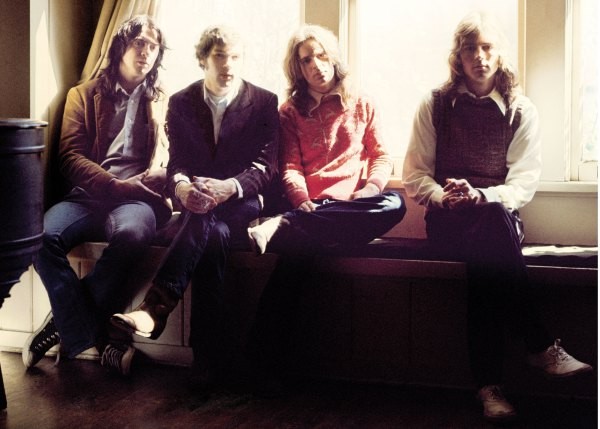
#1 Record era Big Star
As fortune would have it, the CD reissues of the Big Star albums happened right then. Basically it was love at first listen, with the first chunky guitar notes of “Feel,” and then when the band kicks in, it doesn’t sound like anything else from its time. I mean, the songs are amazing, and there’s this clear lineage from the Beatles and the Byrds, and there’s all this cool soul-influenced bit, like “When My Baby’s Beside Me”. It’s just such a great mix. The “cool” sound of that era, the early 70s, was more frumpy, you know, a little rounded off and a little muffley in a way, and that was considered a cool aesthetic. Like it was less corporate sounding that way. And Big Star recordings were just jaw-droppingly crisp and hi fi and amazing. It’s like the Beatles, where the studio they are in just happens to be the greatest studio in the world and it’s this perfect blend. Big Star at Ardent are that.
JA: We’d kind of exhausted our options in Bellingham. So I moved down to Seattle and crashed on Ken’s couch for a while. I got a job at this record store in the University District. And we ended up jamming with Mike and Arthur “Rick” Roberts at that time, and that turned into the band. So I’m working at this record store, and I had a kind of mentor there who was in an older band in Seattle, and he liked our first cassette, Failure. And his logic was that if I was making that music, I must be into certain things. So of course he would mention people like Elvis Costello or Squeeze or XTC and of course I would say yes, I knew their stuff.
He would try to stump me, and one day he said, “Hey, have you ever heard of this band, Big Star?” Then he said, “Look, I”m gonna do something for you here.” And he went to the vinyl section of the record store, which at this point was very small, because CDs were the thing. He said, “I’m gonna do you a solid here, I’m gonna buy this record for you, I’m gonna let you get off work early, and I want you to take it home and I want you to put on this song called ‘September Gurls.'” I’m like, “Well, okay. I get to get off three hours early and I get a free record and I get to go home.” I did what he said. I followed instructions and dropped the needle, and without sounding too corny about it, it was like hearing something that was already part of me or something. It sounded like the greatest song I’d ever heard at that point. I couldn’t believe this song wasn’t a massive international hit. It’s probably at the top of the list of songs that should have been hits but never were. It has all the components, and it has soul too. It’s not just a piece of craft. There’s something that’s beyond the sum of its parts.
That’s a great boss. 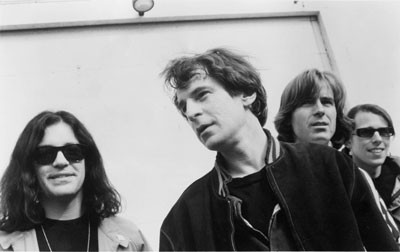
JA: Yeah! And you can imagine how it was in the future, when we got to join that band and play with them for 17 years. Talk about hindsight, when you’re looking at your life in reverse: you don’t really see these moments until you look back at them. It’s pretty remarkable.
KS: By 1993, I’d listened to those records, but I’d never tried to play the bass lines. Yet I’d heard them so many times, when I started rehearsing, I was like, “I already know these bass lines!” I had listened to it so many times, I even had the bass lines memorized by ear. We’re like, Illuminati level nerds on Big Star.
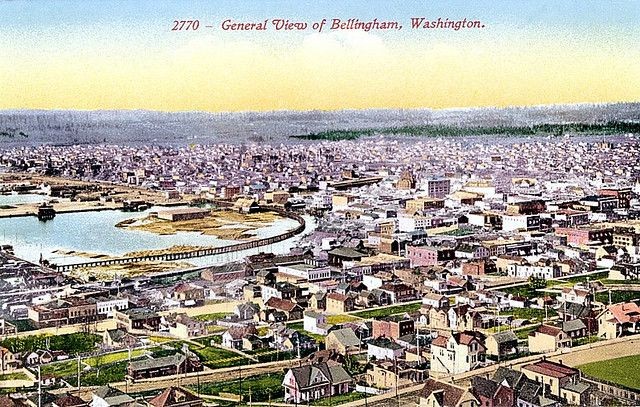
Greetings from Beautiful Bellingham!
So your self-released cassette album, Failure, was your entré into Seattle radio, and later was released as an LP. I must say I’m pretty impressed, revisiting it now, as something put together in a home studio. I understand the recording of that was largely your doing, Jon.
JA: Oh yeah, it’s 99.99% me. [laughs] Yeah that was my job. In hindsight, you don’t really realize the actual fortune you have in your life while it’s occurring. In hindsight, I can’t believe how lucky I was and that my father was into music. I had a working recording studio in my house before this was a common thing. In this era, everyone has a laptop and can record on it, but then it wasn’t so usual. So I’d do the normal things as a teenager. I had girlfriends and we’d go out and try to get people to buy us alcohol and other recreations, and we would have fun and party, but there were also times when I would spend all weekend in this studio space by myself. I would stay up late. I’d work until the sun would come up and then I’d crash and wake up and keep going. Nobody told me how to do it or taught me how to do it. I just had these tools here. My dad showed me a few things and I learned by watching others and asking questions. Mostly it just came from trial and error. And there was a lot of trial, a lot of just messing around.
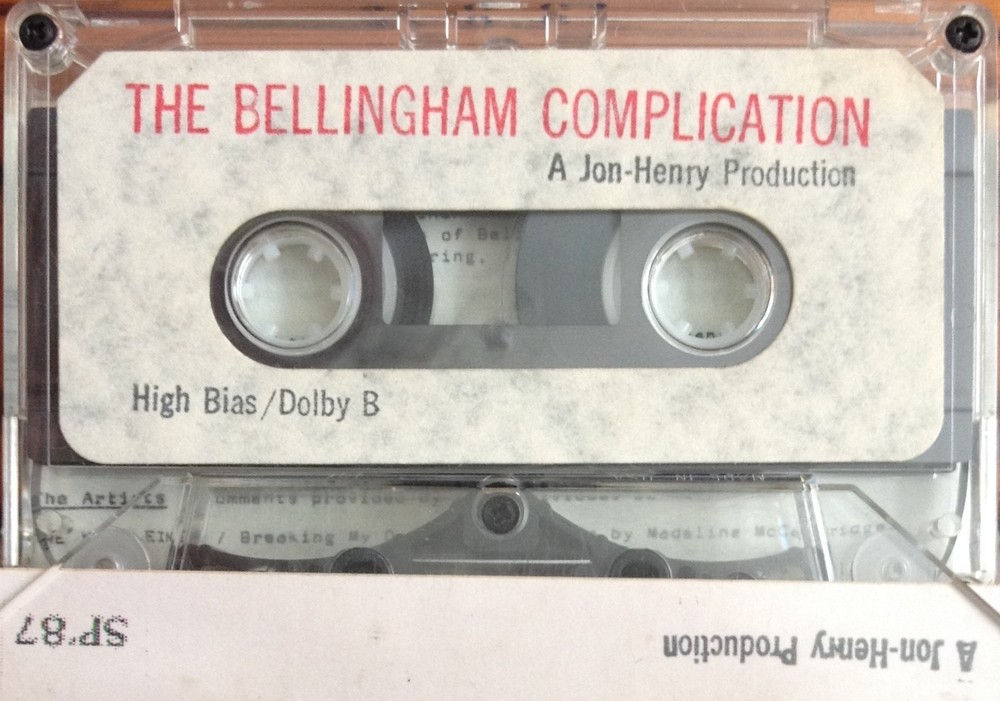
So I was a 15, 16 year old kid recording all the bands in town. And I was working in a record store. My manager was a very good friend of mine. He turned me on to a lot of great records. But he heard what I was doing, and suggested I listen to things like Odessey and Oracle by the Zombies. This wonderful man named Henry Szankiewicz. We formed this little record company called Jon Henry and we put out this thing called The Bellingham Complication. It was the first compilation of Bellingham bands, basically. This is pre-Failure. And we made a limited run of cassettes. And the deal was, the bands would come up to my house, and they each had two hours. We did side one, five bands in one day, and side two, five bands the second day. It was just like an assembly line. And I was the engineer and we were the producers on all that.
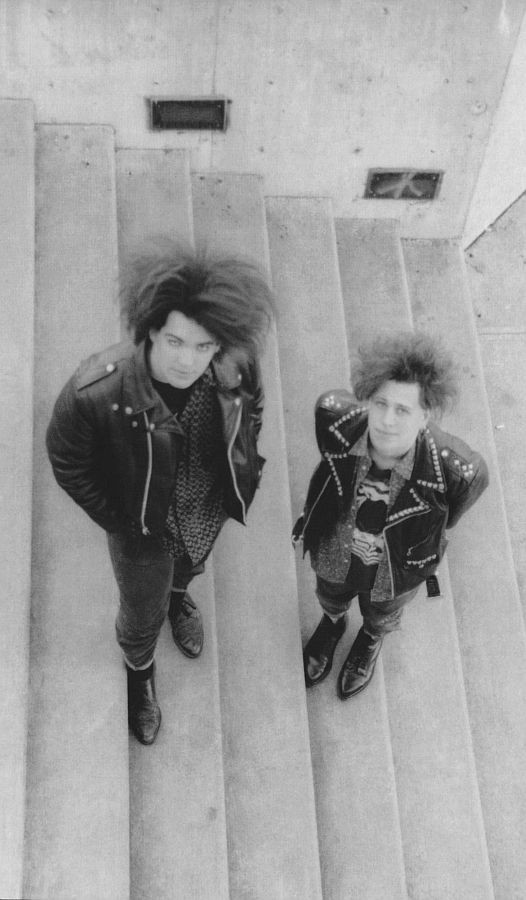
Early Posies
So that led to me being the guy responsible for all things audio in the early years of the Posies. Failure was really made out of necessity. Ken and I were a little awkward, maybe, and we also were going through many different phases. musically and also in terms of fashion. In this era of Failure, we were listening to a lot of pop music. But there was also a big Goth streak in us. In fact, if you look at the artwork on Failure, the picture of us, you can see us still in our Goth phase. So you can imagine how weird it would be to try playing in a band where you look like you were in a Goth band but you wanted to play these 60s influenced pop songs. It didn’t make sense to people, they were like, “Who are these weirdos?” So eventually Ken and I were like, “Fuck it, let’s do it ourselves.” So I played all the drums on the record, and Ken played all the bass to keep it equal. And we just made this record on weekends. Ken was already in Seattle at the University of Washington, and I was going to Western [Washington University], which was the school in Bellingham where my father taught, and we would just knock the stuff out. I think we spent 90 hours making that record.
One more nerdy thing for you about this recording: I didn’t have any great tape deck or DAT machine to mix down to, so I actually mixed everything to a cassette. The CD and vinyl masters are all made from that master cassette, which I still have. My father’s deck had dbx noise reduction on it. So I mixed the instruments on cassette, put that mix back onto 8 track analog, did the vocals, and then mixed that back onto a cassette. And I think it sounds pretty damn good considering that. Whenever I hear people talk about how they’ve gotta have the best this or that, I’m like, “You know what, it just has to sound good. It doesn’t matter what you use.”
And that led to me engineering on [Posies’ second album] Dear 23. The track “Apology” was my 24 track demo in the studio. And I would go to the mastering sessions too. That’s why I have all the backups, all the DATs and CD refs.
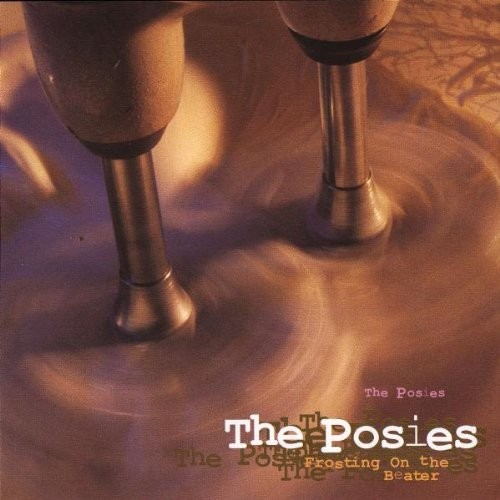
Frosting on the Beater and Beyond
KS: Frosting on the Beater is kind of like a Dinosaur Jr.-ized Big Star in a sense. We actually asked J Mascis to produce it; he wasn’t really doing that at that time. But we ended up working with Don Fleming, who’d worked with Sonic Youth and Dinosaur Jr. And it certainly is true that the guitars are a little tweaked on Frosting on the Beater. But the way that we write and sing is still so sweet that I think Frosting is the perfect balance of the salty and sweet aspects.
JA: You can imagine how for me the current tour rekindles that kind of lead guitar interplay, that guitar/drum interplay that I have with Mike Mussberger from that era. That’s kind of what Frosting on the Beater was about. That’s also the record where I felt that we started to deliver something that could be called our own sound. It wasn’t as much wearing the influences on our sleeves, as we were doing on Dear 23 and Failure. I really feel like we came into our own. Besides the vocals and the songwriting, a lot of the guitar sounds are very unique. And that’s kinda what that record’s about, the incredible drumming and the awesome guitar sounds.
My guitar sound just kind of happened accidentally in my basement, late one night. I was recording “Coming Right Along” as a four track cassette demo. We tried to do a full band version of that, which is on the re-release. But in the end Don Fleming deemed the demo version better. So we took my harmony off the demo and added Ken’s and that was pretty much it.
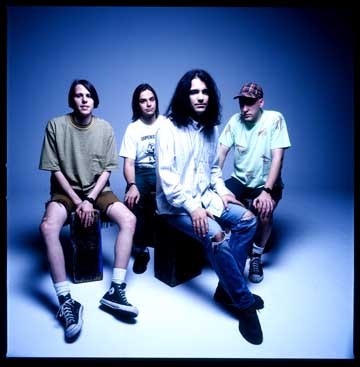
Frosting on the Beater era Posies
Hearing that guitar sound for the first time was exciting. And I think that really influenced the rest of the record. It was all pretty much this one guitar, which is a very cherished item to me: a 1973 cream colored, three-pickup Gibson SG Custom. And I would use the rhythm pickup. And my father was a musician and he had this amp, a Fender Super Champ. It was a Paul Rivera design, with these high gain stages and this pull pot and this incredible spring reverb in it. I didn’t use my father’s, but I stumbled onto one in a pawn shop, and it was pretty beat up and worn. Someone had replaced the grille cloth with a bandanna. It looked horrible. But I plugged it in and turned the gain and the reverb all the way up. And that was the sound. Instantly. And I was like “Whoa!” Everybody who’s heard it, wants to know what the sound is on Frosting on the Beater.
Frosting was also the first record with extensive touring, and the first era of the band when we really became a good live band. If you saw us back in the day, on the Frosting tours, we were on fire, man! We were young, we were into it. But we also had the experience of touring on Dear 23 and working out a lot of the kinks and the awkwardness. We kinda knew more what we were doing at that point. Of course we had Mike, and then Dave came into the picture. The chemistry occurred, and that was that.
The Current Tour
I think a lot of people are gonna be psyched to hear the old line up again in this 30th Anniversary Tour. How is that working, after playing for many years with other side men?
KS: Things were fairly volatile back in the day. No one was very secure in their role, or our role in music. We were striving to establish something, and also to become grownups. And it wasn’t very smooth.Jon got married at that time, I got married at the time of Frosting, but we didn’t have successful first marriages. So the kinds of things that give you stability and maturity hadn’t really come into the picture. And there were often times when we certainly didn’t appreciate each other the way that we should have.
So all of that, of course, is long gone. Now we’ve done different things, realized what a great moment that was and what a great opportunity that was, and that we didn’t totally blow it. I don’t see the story of our band as a tragedy. I see it as, we did pretty good. We didn’t bust into the upper echelons of the million sellers, which would have been nice, but it certainly wasn’t the Big Star story, where they had bad deal after bad deal that basically left them selling like couple thousand records. You know, we sold more records the day that Amazing Disgrace came out than Big Star sold in their whole career, until later. Anyway, I think everybody’s just really happy to be here, and we’ve got kids and marriages and we’re grown ups. It’s as simple as that.
I’m sure that’ll come through in the playing also.
KS: Yeah, I would say that the old Posies were a great live band, most of the time. But you throw in twentysomething partying and all the personal stuff, and though we had a kind of magic, we really didn’t know how to direct it and control it. Now, I think we’ve got magic that’s completely in control. Like, you’ve got the wizards going now. We put so much focus onto the show, and we don’t do stupid stuff that would imperil that, and we can handle our liquor. So when we get onstage it’s bangin’.
I have to say, one other thing I’ve been noticing: Basically everybody is working together. We have a lot of quirks. We make quirky music. And I think back in the day we might have found someone else’s quirks annoying, and I think people also didn’t rein it in. Your personality shouldn’t extend so far in the van that it takes up another seat, you know what I mean? We’re working together, is what I’m trying to say, and it makes everything easier. Back in the old days, it felt like making progress was like pulling a 500 ton sled through a fucking field of mud, and here I feel like, even with these hefty drives, it’s like skiing through fresh powder. It’s a dream.
Do you foresee future music-making with the reunited quartet?
JA: I kinda just have to focus on the now moments. And many of them are great. Personally, I’m very happy that this lineup is together again. For me, the Frosting on the Beater lineup of the Posies is my favorite lineup of the band that ever existed. I gotta qualify that by saying I’ve had pretty deep relationships with everybody that we’ve played with. These are all people that consider close friends, really. And some I see more of over the years. I made a record with Joe Skyward, for instance, who was on Amazing Disgrace, and I’ve toured and made records with Brian Young, who also played with Fountains of Wayne before coming on to Amazing Disgrace.
But as far as the actual playing, this is the best lineup. Dave Fox, the way he plays his bass, he’s got this feel that I like, and he’s not overly muso about what he plays. And then you couple that Mike Musburger, who, without sounding too much like a gushing schoolkid, for me he’s one of the great drummers of all time. I was gutted when he was no longer in the band. That was a big blow for us. As a musician, you must appreciate the value of a good drummer. A great drummer can make a good band great. You’ve gotta have that foundation there. And not only do we have that foundation with Mike, but he provides a lot of the window dressing too. ‘Cos he’s the kinda drummer that other drummers bow down to. Hey audience, if you’ve never seen Mike Musburger play drums before, it’s a sight to see.
Given your time in Big Star, coming back to Memphis must mean a lot to you both.
JA: Oh yeah. And Memphis has been so good to Ken and I. In a way, we’ve been adopted by Ardent and Memphis and that whole scene. I mean, even when Big Star received a Memphis Music Hall of Fame award, they put Ken and I in the hall of fame as well, for our contribution to propagating Big Star. We weren’t expecting that and were very touched by that.
I would count Jody Stephens as one of my dearest friends at this point. He’s just such a warm human being. Anyone will say that about him. I’m just glad that we have that relationship and those experiences together. 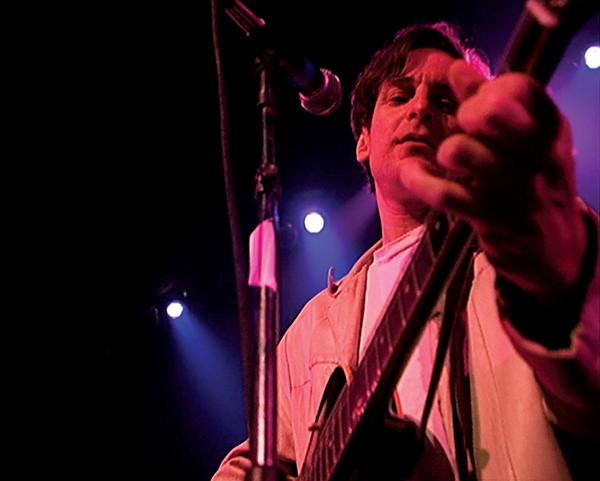 Louis D Graflund
Louis D Graflund
Big Star at New Daisy
And Alex Chilton. I got to hang out with the guy a lot. He was a really interesting man. Some of my favorite times were just hanging out with him with a guitar and telling stories and just playing whatever. He was almost better when people weren’t looking. Yeah. To quote Alex, “it’s a gas.” It’s always a gas to come back to Memphis.
The Posies Chime In On Power Pop, Band Chemistry, and Big Star